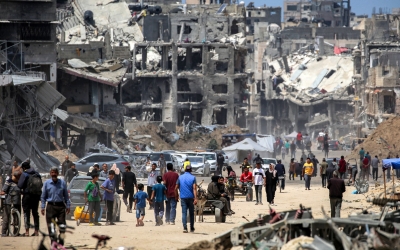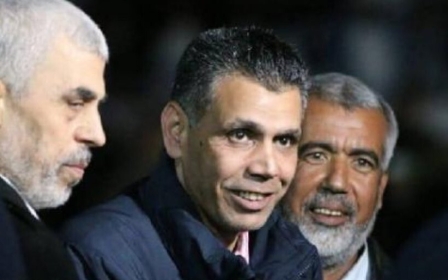Hamas says no ceasefire talks while Israel continues offensive on Gaza

(Eyad Baba/AFP)
Hamas told meditators it will continue to boycott ceasefire talks while Israel lays siege to the Gaza Strip, but is ready to agree to a hostage deal if Israel ends its offensive on the besieged enclave.
“The Hamas movement and the Palestinian factions will not accept to be part of this policy by continuing negotiations in light of aggression, killing, siege, starvation, and genocide of our people,” Hamas said in a statement on Thursday.
“Today, we informed the mediators of our clear position that if the occupation stops its war and aggression against our people in Gaza, we are ready to reach a complete agreement that includes a comprehensive exchange deal.”
Hamas’s statement comes days after Israel said it is preparing to continue waging war on Gaza for another seven months, and seized the Philadelphi Corridor, a strategic strip of land between Gaza and Egypt.
On Tuesday Middle East Eye reported that Hamas was ending ceasefire talks with Israel unless it withdraws from Rafah and reopens the Rafah crossing.
New MEE newsletter: Jerusalem Dispatch
Sign up to get the latest insights and analysis on Israel-Palestine, alongside Turkey Unpacked and other MEE newsletters
"They (Israel) must first stop the massacres, leave the Rafah crossing, and stop the aggression - then we can talk. Until that happens, there will be no discussions," a source close to the Palestinian organisation told Middle East Eye for the earlier article.
Ceasefire talks have been stalled since 6 May, when Hamas had agreed to a proposal put forward by Egypt and Qatar. Israel rejected the deal and that night launched its invasion of Rafah, a southern Gaza border town where about 1.5 million Palestinians are sheltering.
The fate of the talks became a point of contention after CNN reported that an Egyptian intelligence official had “quietly changed” the terms of the proposal, surprising negotiators, including the US, and leading to Israel rejecting the deal.
But Middle East Eye reported on Thursday that CIA director Bill Burns, who is leading mediation on Washington’s side, approved the proposal Hamas accepted before it was submitted to Israeli officials.
Hamas flexible on postwar government
Talks on a ceasefire were due to resume this week, but Hamas told international mediators on Tuesday it was ending its participation following Sunday's "massacre" in Rafah by Israel.
At least 45 people were killed and dozens more wounded, most of them women and children, when Israel struck a camp housing displaced Palestinians in the Tel al-Sultan neighbourhood of western Rafah. The attack came just two days after the International Court of Justice (ICJ) ordered Israel to halt its offensive on Rafah.
A source close to Hamas told MEE previously that the group would not resume talks unless Rafah is reopened under its previous administration.
Hamas’s public position that it will not negotiate while Israel continues attacking Gaza is in keeping with what a source close to the group told MEE: "Hamas does not have to sit down for negotiations while the Israelis continue killing.”
According to sources familiar with Hamas, the group wants the US to put pressure on Israel to agree to a deal that would lead to an exchange of hostages and a ceasefire.
The group has also shown “flexibility” about the future governance of Gaza, a senior Palestinian source with knowledge of Hamas's policies told MEE, noting that the group’s key demand was for post-war governance to be settled among Palestinian factions and not be imposed by either the United States or Israel.
Middle East Eye delivers independent and unrivalled coverage and analysis of the Middle East, North Africa and beyond. To learn more about republishing this content and the associated fees, please fill out this form. More about MEE can be found here.





